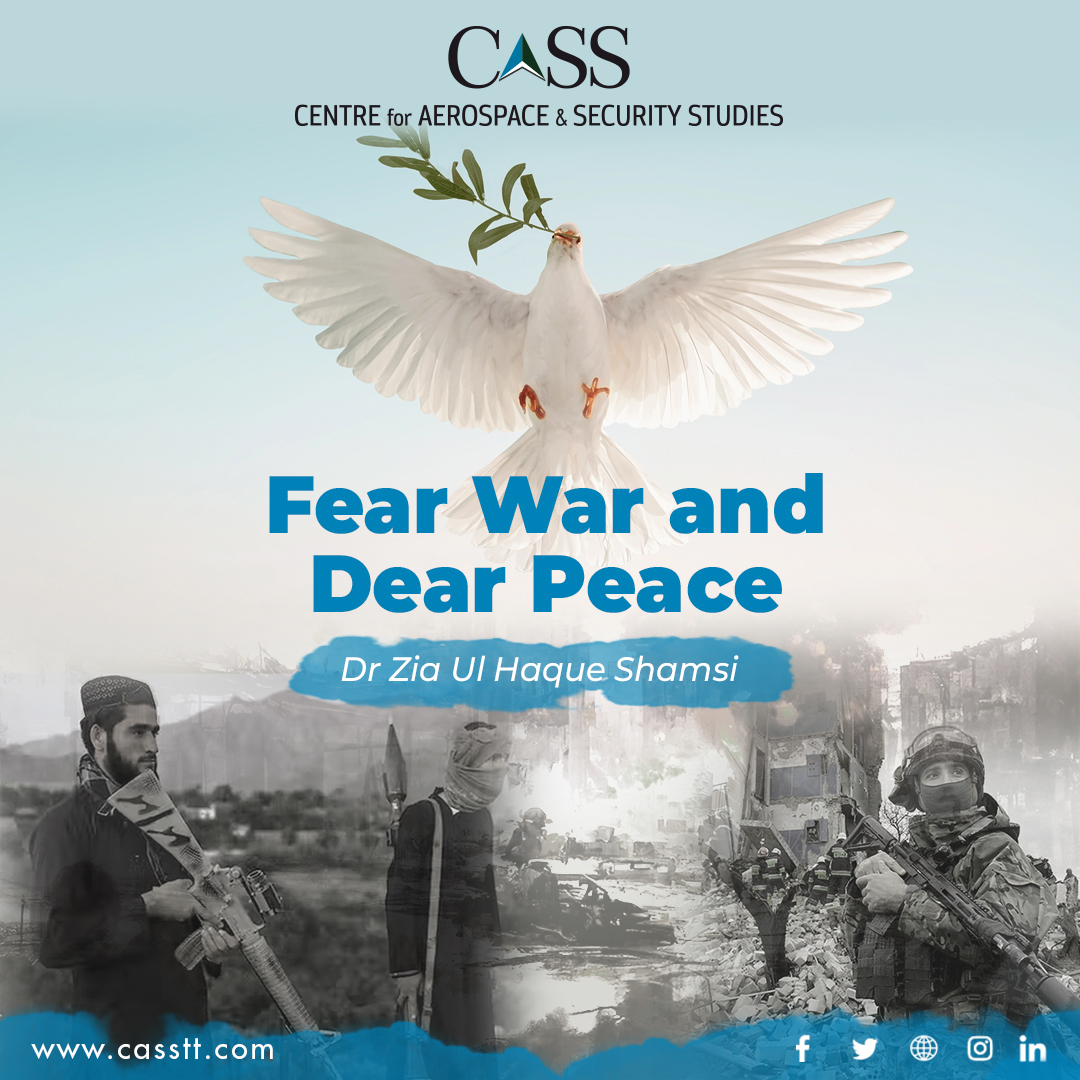In another article ‘Warfare versus Welfare’ published in Daily Times on October 11, 2022. I argued that ‘While warfare brings pain and punishment (P2D2) for the poor people of a developing nation, absence of war and welfare can bring peace, progress and prosperity (P3), dignity, desire, and development (D3) among the unspoken, unheard, and undernourished people in the underdeveloped countries and the regions.’ However, people may argue that if one reflects fear of war, it would be taken as a sign of weakness, particularly by the realists. Perhaps yes, but if one fears war due to concerns for deaths and destruction of non-combatants, women, children, and old, one will certainly dear peace.
It is necessary to understand that modern-day wars have become too lethal and unforgiving, thanks to dual use evolving technologies that are initially developed to serve mankind and later overly utilized for making deadly war machines.
Being a fighter pilot, I do not fear the thunders and sounds blasts, but the concern remains for the people who did not know why they were targeted. Therefore, it is incumbent upon global stakeholders to understand that peace must be preferred over war while exploring policy options.
Let’s have a brief comparison between the impacts of war and peace to attract the attention of the decision-makers. While war causes destruction, peace brings development. While war brings frustration, peace carries smiles. While war underlines uncertainty, peace brings stability. War injects defiance, while peace promotes acceptability. War destroys investor confidence, peace attracts investments. War pushes states back to the stone ages, period of peace provides an opportunity to grow and catch up with the developmental trends. While war leaves streets empty, peace fills the stadiums. War leaves little room for the people to celebrate their domestic rituals, and peace invites festivities. While war bans the movement of people, goods and services, peace encourages a free flow of people across borders. War forces people to abandon their homes, peace helps people build their homes.
This century is only 22 years old, and we have had far more wars and conflicts within this short span of time than any other period in history.
The list of cost-benefits of wars and peace can go and on, only for the stakeholders to realize that there can be no rational comparison between war and peace. While idealism or liberalism have also failed, Realizm and Peoplism may be considered to bring peace and stability around the world, before the existing international collapses under its own weight of tyranny, oppression, and subjugation of the poor and marginalized.
Staying close to home, if we look at the enduring rivalry between India and Pakistan, we come to conclude that unless Pakistan and India realize the consequences of an unthinkable nuclear war, the probability of nearing an enduring peace would remain distant. Over the past 75 years, the two nuclear neighbours have fought all-out wars before nuclearization, limited conflicts in the post-nuclear environment, and also been through numerous crises, and they, perhaps still consider war as another policy option to resolve their disputes. It appears as if both India and Pakistan do not realize that the paradigm has changed, and conflict has transformed to another level where all-out war is no more an option under the nuclear overhang, and something different would have to be done to remove the long prevalent uncertainty and dangers of an unthinkable nuclear exchange.
The US President’s assertions that Pakistan is the most dangerous country in the world and its nuclear programme is out of coherence, are not without a purpose, especially after its strategic partnership with India under the Basic Exchange and Cooperation Agreement (BECA). India gets access to real-time intelligence, communication, and guidance through a state-of-the-art geospatial surveillance system that may give it an overwhelming edge in any future conflict.
Away from home, the European war between Russia and Ukraine has already entered its ninth month. Although Ukraine is getting enough military, economic, and diplomatic support from the majority of the world including the US, it has been ruined totally and lost at least four of its eastern regions to Russian forces.
My argument is that if every war has to conclude with a peace deal, why not begin to resolve the conflict with peace dialogue? The latest example could be Afghanistan. The two-decade-long culminated in Doha Agreement signed on February 29, 2020, between the US and the same resistance group of Taliban, who were ousted from power after the unfortunate events of 9/11. One can only wish that President Bush had given more time to diplomacy before undertaking one of the deadliest bombings on Afghan territory, which ultimately failed to deter the battle-hardened Taliban, and finally, the US and allies left Afghanistan before August 15, 2022.
Let’s give it a break. This century is only 22 years old and we have had far more wars and conflicts within this short span of time than any other period in history. Beginning with Afghan War II, we entered into Gulf War II, a wave of Arab spring, Georgia, Crimea, Yemen, Syria, and Libya, and with continued oppressive operations in Palestine and Kashmir. Unless we are waiting for a bigger international shock than the Pandemic to understand Allah’s will that the unjust killing of one person is like killing the entire humanity.
The writer is the author of the book ‘Nuclear Deterrence and Conflict Management Between India and Pakistan’. He is presently working as the Director (Peace and Conflict Studies) at the Centre for Aerospace & Security Studies (CASS), Islamabad, Pakistan. The article was first published in Daily Times. He can be reached at [email protected]





